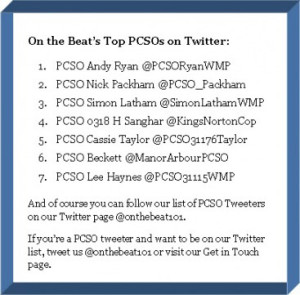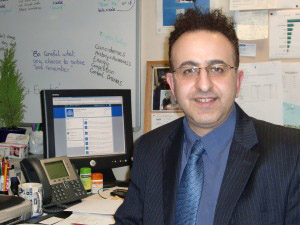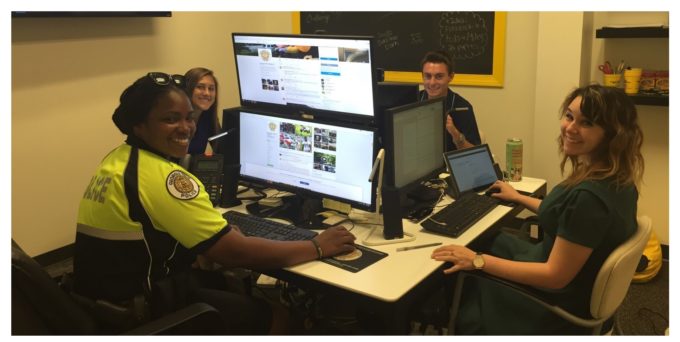Policing with Twitter

Social Media and Policing the Community
Note: This post was previously published at onthebeat101.

In this first feature on technology I’ll be exploring the role of social media in community policing. What role do services like Twitter and Facebook have to play in policing the community and in the lives of PCSOs? Are they time wasters or can they help officers be in touch with the areas and citizens they are responsible for?
There are more PCSOs, police officers and police services on Twitter than ever before – some with over 1,500 followers – so what are they tweeting about, who’s listening and what’s the point?
The police’s use of Twitter and social media has been severely criticised in some quarters – Fiona McEvoy, of the TaxPayers’ Alliance, said: ‘The police should be catching criminals, not wasting time on social websites…‘These diversions are not necessary and ultimately cost the taxpayer money.’
PCSO with over 1,500 Twitter followers
After last summer’s riots and the subsequent reports into their causes, it became apparent that better relations between police and communities were essential. One of the key issues that people involved in the disorder cited again and again was a hostile relationship with the police, based around dislike, distrust and even hatred.
One of the suggestions of the HMIC report was:
“The development of a far more systematic and structured approach to community engagement by neighbourhood policing teams and other local policing assets”
Improving relations relies upon improving communication. Communities need and deserve to understand what the police do on a day-to-day basis, as well as what long term projects they’re involved in and what goals they are working towards. Churning out “success stories” in press releases just isn’t enough anymore.
Life on the beat is not like TV
PCSO Simon Latham,who has some 600 followers, believes Twitter can play an important role in raising PCSOs profile. He told onthebeat101: ”Some people do not know what a PCSO does; as PCSOs have had bad press in the past so it is an opportunity to showcase the work we carry out on a daily basis. It should also help people understand that life on the beat is not always like it is portrayed in some TV programmes.”
We interviewed PCSO Andy Ryan, a big presence in the PCSO twittersphere with over 1,500 followers. He told us: “neighbourhood policing is about listening and communicating with your community and identifying new ways to do that”.
A friendly face behind the police
The joy of twitter is that it’s all about interaction and engagement. A personal PCSO or police service Twitter account allows quick and cheap communication of what they’re doing.
Pierre Petrou, Head of Business Operations at MPS Camden, who manages the Camden MPS Twitter account, explains the benefits of Twitter to a police service…
PCSO Simon Latham says: “My use of Twitter is generally informative – updates into my day’s activities, crime prevention, appeals for information, and generally a way of interacting with users – some local to my patch, others not. Twitter offers a platform to show a friendly face behind the name and a contact within the police.”
Indeed, the Met told On the Beat 101 that “The MPS use of Twitter and other social media tool is to increase direct engagement with the public”.
Twitter increases engagement with the public
Reading updates on your phone has an immediacy that’s second only to talking face to face. Tweeting updates on police work is so fast it captures the moment and gives a feel of how policing works.
PCSO Andy Ryan says Twitter “lets me inform the local community about what the team are doing to solve local issues in the community that have been raised as a concern”.

PCSO Simon Latham agrees: “There is a huge twitter audience who may not have contact with the police usually, and Twitter is a quick, easy and modern way of communicating with them and the outside world especially people who aren’t from the police. It is also useful for information, as after building a rapport with users, they are willing to provide information – for example on crime, abandoned vehicles, issues affecting their neighbourhood.”
And if communities can understand how policing functions and what it’s about, perhaps trust can be restored.
Twitter and Facebook accounts are free
However, even if it’s free to set up a Twitter or Facebook account, developing a strategy for social media engagement does take time and energy – but it’s worth having one. And of course different forces will have different approaches.
Pierre Petrou, who is responsible for sending out the tweets from the MPS Camden Twitter account, describes how often he tweets and why…
On the Beat has learnt that the MPS ran several pilot Twitter schemes in London boroughs first. After this period, boroughs that wanted an account could apply to the Met for one. The Met told us that they now “aim to have all 32 boroughs up and running with Twitter accounts in the near future”. Pierre Petrou told onthebeat101 that: “The management boards at the Met have decided that social media is the way forward.”
Onthebeat101’s Twitter pageBoth individual PCSOs and police officers tweeting personally and police services need to think carefully about when and what to tweet. All sorts of people follow PCSO and police service Twitter accounts: members of the local community, local businesses, friends, journalists as well as other officers and services.
PCSO Simon Latham told us about how he uses Twitter: “Tweeting does not take long. Generally, I access Twitter for around 5-10 mins a day. It only takes 20 seconds to type out a tweet so does not distract me from my daily patrolling duties.
Pierre Petrou agrees that officers needn’t spend too long on Twitter!
Read More:
You can find out more in our full interview with PCSO Andy Ryan – one of the most popular PCSOs on Twitter, and by reading our Top Tips for PCSOs on Twitter. The Met told onthebeat101 that they are launching a new Twitter page on their website soon, so keep your eyes peeled for that! You can also listen to our full interview with Pierre Petrou of Camden MPS.
And if you’re still unsure about starting tweeting or what to tweet about, take a look at our Top PCSOs on Twitter. Why not follow us: @onthebeat101




